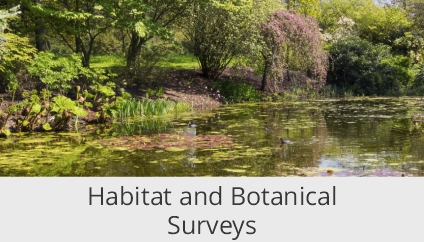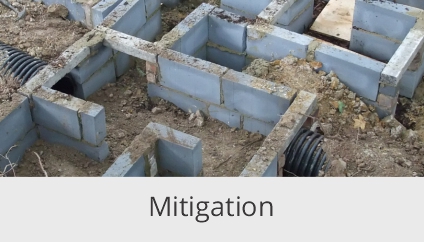
Comprehensive Services from Aspect Ecology
Aspect Ecology provides the full range of ecological services from Phase 1 habitat surveys to detailed Phase II National Vegetation Classification habitat and botanical mapping.
Our ecologists hold licences to survey protected species whilst we also regularly carry out surveys for rare or priority species groups including mammals, birds, amphibians, reptiles or invertebrates. Aspect Ecology’s team of professional ecologists are able to undertake over 95% of our survey workload in-house, while we maintain close links to specialists who we are able to draw upon as required.
1
The team are also exceptionally familiar with BREEAM and biodiversity offsetting/net gain and our experience allows us to readily advise clients how to maximise the ecological credits/units achievable.
Further details on the services we provide are set out below:

Strategic Advice
Aspect Ecology offers comprehensive ecological advice throughout the lifetime of a project from pre-purchase due-diligence surveys and identification of potential ecological constraints to inform site promotion, through to the development of emerging masterplans and the production of supporting documents for planning applications.
Aspect Ecology’s strategic ecological thinking, expert knowledge and pragmatic approach ensures ecological constraints are identified early on in project development, ensuring biodiversity can be safeguarded and accommodated within schemes, whilst maximising the developable area available.
Our ecologists focus on identifying cost-effective and realistic strategies to help clients explore the development potential of challenging sites of all sizes.

Aspect Ecology’s ecologists hold survey licences issued by Natural England (NE) / Natural Resources Wales (NRW) / Scottish Natural Heritage (SNH) as required when certain groups or species, e.g. bats, Great Crested Newts, may be encountered.
In addition, other species may be rare, scarce or declining and, although may not receive legal protection, may be of conservation concern. Aspect Ecology’s ecologists are able to conduct surveys for all such species. Please get in touch to discuss specific project requirements.

Habitat and Botanical Surveys
Aspect’s ecologists regularly undertake the full range of habitat surveys across the UK. Our survey experience encompasses the majority of UK habitat types from lowland Dorset heathlands to Scottish uplands and estuarine saltmarsh as well as all the more commonly encountered habitats such as ancient woodland (ASNW and PAWS), secondary woodland, grasslands and agricultural land.
Aspect Ecology’s in depth experience of habitats in relation to policy and legislation is regularly called upon by clients requesting assessments of the potential effects of proposals on designated sites e.g. SACs (Special Areas of Conservation), SPAs (Special Protection Areas), Ramsar sites, SSSIs (Sites of Special Scientific Interest), National/Local Nature Reserves and County/Local Wildlife Sites, with expert evidence presented at inquiry to support the findings of these surveys whenever required.
Aspect Ecology holds particular experience in surveying urban habitats, and the species and community types supported. Brownfield sites in particular can be extremely variable, with some supporting little ecology and others supporting invasive species such as Japanese Knotweed or local rarities.
Methodologies commonly employed include Phase 1, extended Phase 1, Phase II/National Vegetation Classification (NVC), River Corridor Surveys and Hedgerows Regulations Surveys, while novel survey methods are employed as needed to fit specific project requirements.

Environmental Impact Assessment
Aspect’s ecologists are regularly called upon to contribute to professional consultant teams in order to assess the impacts of proposals under EIA (Environmental Impact Assessment) legislation.
EIA is employed as a tool for assessment across an increasing number of sites in the UK. Aspect Ecology’s approach seeks to understand the environmental baseline conditions and, in turn, feed these existing conditions into the site layout, so that a balance is reached between the capacity of the receiving environment and maximising the achievable development to make best use of the available land.
Aspect Ecology’s consultant teams offer expertise in developments encompassing retail, residential, commercial, industrial, minerals, fisheries, highways, airports, rail and inland shipping.

Biodiversity Net Gain
One of the overarching themes of the National Planning Policy Framework (NPPF) is that of sustainable development, which includes moving from a net loss of biodiversity to achieving net gains for nature. The new standard for demonstrating biodiversity sustainability in the planning process is through the provision of biodiversity net gain (BNG). BNG is formalised within the Environment Act 2021 with its requirement for mandatory BNG in place from 12 February 2024.
Aspect Ecology is highly experienced in carrying out BNG compliant survey work and subsequently undertaking biodiversity impact calculations to quantitatively assess development proposals. The national industry standard Statutory Biodiversity Metric utilised to determine net gain outcomes. Our ecologists are experienced in the application and optimisation of the Metric’s requirements so as to maximise the net gain achievable on sites. Where a net gain on site is not possible, we utilise our network of providers to bring forward off site solutions where these are beneficial. Read our ‘Briefing for developers. Biodiversity Net Gain – The Basics’ here.

BREEAM
Aspect Ecology carries in-house expertise in advising on maximising available ecological credits within BREEAM (Building Research Establishment’s Environmental Assessment Method) and BREEAM for Offices, Retail, School and Industrial.
Our professional associations mean we are classed under BREAAM as “suitably qualified ecologists” being accredited to both the Chartered Institute of Ecology and Environmental Management (CIEEM) and the Institute of Environmental Management and Assessment (IEMA).
Our ecologists are able to advise in terms of likely credit scores at both the preliminary and full stages of a BREEAM assessment.
We aim to maximise credit scores for minimum cost, whilst maintaining the developable area of any site

Invasive Species
Aspect’s ecologists regularly undertake surveys for invasive species.
We can advise on the legislative issues associated with the presence of certain species and their implications within development sites, for example in terms of compromising built structures.
Typical species encountered may include Japanese Knotweed, Giant Hogweed and Himalayan Balsam, while other invasive species may often be of concern, particularly on the aquatic environment, such as New Zealand Pigmy Weed, Parrot’s Feather and Water Fern.
Mitigation programmes can be drawn up and the most effective methods of dealing with each species determined on a site by site basis.

Mitigation
Aspect Ecology seeks to safeguard any ecological interests present, whilst also maximising the area available for development through the careful design and implementation of industry leading mitigation schemes.
Aspect Ecology’s ecologists work closely with our clients to ensure that mitigation measures can, wherever possible, be incorporated within development frameworks. Where achievable, we will work to retain any ecological features or species within the development site, but on occasion where this is not possible, translocation programmes can be designed to relocate species to safer receptor sites in the near surrounds.
We have particular experience in habitat creation, restoration, re-creation and translocation, and our knowledge of the latest research allows us to successfully implement innovative mitigation schemes to facilitate development.
Where protected species are encountered, mitigation works may need to be licensed, typically in England by Natural England. Aspect Ecology’s ecologists regularly obtain licences to implement mitigation schemes, whilst our ecologists also hold class licences in relation to Water Voles, bats and Badgers, allowing certain mitigation measures to be carried out without the need for specific project mitigation licences to be applied for. Recent examples include the closure of Badger setts and creation of new artificial setts, re-development of bat roosts and creation of new roost sites and translocation of Great Crested Newts to newly constructed ponds.
In some cases, licences cannot be issued for works affecting protected species. In these cases, mitigation schemes must rely on defences within the legislation, although schemes can often be agreed with the relevant statutory nature conservation body. Recent examples include in respect of Black Redstart, Peregrine Falcon, Barn Owl, Hedgehog, Slow-worm, Common Lizard, Grass Snake and solitary mining bees.
Aspect Ecology’s experienced ecologists provide a range of expert Ecological Clerk of Works (ECoW) often required during the above mitigation works. Our experience of ecological supervision includes but is not limited to providing ECoW for installing Great Crested Newts and reptile fencing, protected species translocation exercises, ecologically sensitive building demolition, habitat manipulation exercises including hedge, scrub, grass and tree works/removal, installation of faunal enhancements such as bat, bird and Dormouse boxes, creation of faunal enhancements including hibernacula, log piles and refugia, works to sensitive water bodies including pond restoration and habitat enhancement/creation such as protected plants translocation and Open Mosaic Habitat creation. Aspect Ecology can provide bespoke ecological supervision at the forefront of techniques and knowledge being utilised within the industry.

Expert Witness
Aspect Ecology’s senior team regularly present evidence as expert witnesses at section 78 appeals, call-in inquiries, local plan inquiries, compulsory purchase order and highways inquiries, working with Barristers from a range of chambers such as Landmark, No. 5, 39 Essex and Francis Taylor Buildings.
Evidence recently presented covers a diverse range of issues from the effects of air quality on Special Areas of Conservation, the effectiveness of species mitigation programmes, the effects of a waste transfer station of woodland biodiversity, the benefits of the creation of nature reserves and open access land, the quality of habitats present, mitigation schemes for protected species and ecological impacts of dual carriageway schemes. In addition, Aspect Ecology has particular niche experience in respect of advising on ancient woodland matters at appeal alongside advising on matters of the historic landscape such as the value of traditional orchards and habitat re-creation options available.

Habitats Regulations Assessment
European designated sites, such as SACs, SPAs and Ramsar sites, are afforded strict protection under UK and European law and policy. Competent authorities, such as local planning authorities, have a legal obligation to consider whether any plan or project is likely to have an adverse effect on a European designated site, through a process known as a Habitats Regulations Assessment (HRA).
Aspect Ecology’s extensive experience and knowledge of European designations enable us to closely advise developers as to how projects can be modified to ensure compliance with the legislation as well as providing comprehensive advice regarding mitigation options to avoid such effects. Recent project examples include assessment of coastal SPAs in respect of oil and petro-chemical storage and refinery re-development, assessment of air quality matters in respect of heathland SACs and assessment of potential effects of recreational pressure on unimproved grassland SACs. Although the onus is on the competent authority to undertake the HRA assessment during the planning process, Aspect Ecology regularly provide comprehensive information to allow the assessment to be carried out, which often requires the close integration of our work with that of other disciplines such as transport and air quality.











